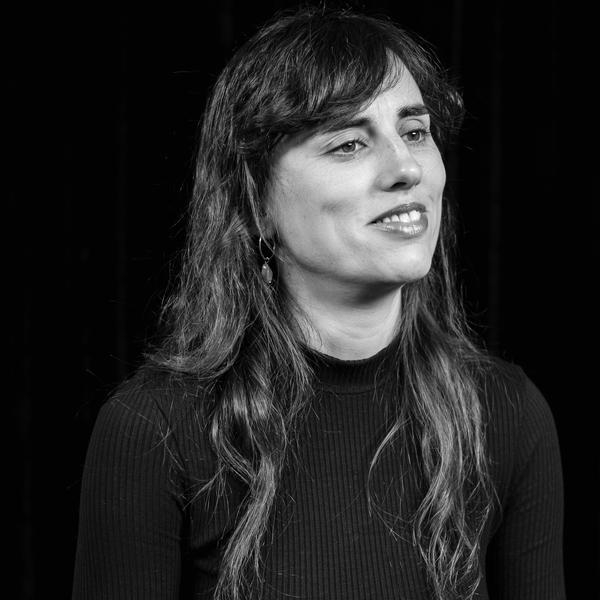Baltic Event Co-Production Market
Climacteric
As menopause coincides with a world in collapse due to pollution, a woman's personal transformation aligns with nature, mutating her reality.
A few days after the unexpected death of her parents, Selva begins to experience strange changes in her body, which are diagnosed as early menopause. When she visits her hometown, her transformation accelerates and intensifies, syncing with the environmental devastation of a land exploited by factory farms. The rage of menopause becomes a driving force for animal liberation and the defence of the earth.
Main country of production
Spain
Director's note
The word climacteric etymologically means 'step' or 'rung' and refers to the final stage in a woman's life, basically identified with reproductive failure. In our society, the image of a young woman with a normative body is synonymous with beauty and fulfilment. By exclusion and omission, menopause represents the opposite. Even for women, it's taboo to talk about menopause; we're ashamed to admit it out loud in case it triggers all the accompanying clichés, and we suddenly become wrinkled, shrunken, asexual, in decline, and worthless. It's precisely this social perception that causes us to reach menopause without reference points or sufficient information. Menopause is a physical and mental change of the same magnitude as the arrival of menstruation in adolescence. The resulting drop in oestrogen levels alters hormonal composition, triggering a physical and psycho-emotional transformation that can turn our lives upside down. I'm talking about CHANGES in capital letters that profoundly alter our development and health, both physical and mental.
My understanding of the climacteric began four years ago, following early menopause, and has since grown, fuelled by hours of reading and research. On the other hand, my concern about climate change, especially in relation to intensive livestock farming in Central Catalonia, goes back much further – to my childhood. Intensive livestock farming has deforested the area, polluted the water – in the last four years, the average nitrate level has increased by 45.2% – and dried up river basins – in 2023, Catalonia will be one of the three regions with the most water stress in Spain. The Osona region is the area with the highest CO₂ pollution from the livestock industry in Spain, and also has the most polluted atmosphere in Catalonia. Vic is among the 15 places with the most ammonia pollution in the world. I've seen the changes caused by intensive livestock farming in this region firsthand because it's where I grew up. But I'm not talking about an isolated situation; I'm talking about an economic model that is the backbone of a fierce extractivist economy in Catalonia, Spain, and around the world.
How are climate change and menopause related? Just as menopause implies a transformation in the body, climate change also represents a global transformation that affects the environment, species, and ecosystems. In fact, some studies suggest that climate change could have effects on hormonal processes due to factors such as heat stress and air quality.
At the beginning of the story, Selva is a dependent, unnatural person, guided exclusively by reason. She is socially conventional and unspiritual, but the onset of premature menopause transforms her life. When she returns to the village where she grew up, she realises that both she and the land seem to share the same decline – drought, exhaustion, degradation – and a communion between her, the exploited animals, and the polluted ecosystem pushes Selva's menopause beyond the limits of reality, leading her towards a complete metamorphosis. In this transformation, menopause exerts its emancipatory power, making Selva more independent and fostering a connection with nature that allows her to trust her instincts and forget convention. In essence, she has left behind biological fertility to find spiritual fertility. Protected by this new form, Selva will feel her instinctive power vibrate, and her rage will reclaim the exploited beings and territory.
'Climacteric' begins as a realistic film, and little by little, as Selva's metamorphosis evolves, so does the film itself. Our story gradually infiltrates the fantasy genre, transporting us to a world of its own with a cathartic ending.
Producer's note
'Climacteric' is an auteur film with genre touches and fantastic elements. It advocates for the synchronisation of women's bodies with the environment and explores how climate change and the loss of our habitats directly affect our cycles and disconnect us from biological rhythms. It is also a story of transformation, growth, and change, which brings to the table a silenced topic: menopause. The fourth feature film by Liliana Torres represents a step forward in her career, not only because of its tone and cinematic elements but also in terms of ambition. It is a great fortune to see her grow alongside us as producers and to discover with her the desire to explore new languages and possibilities to tell stories linked to women with enormous curiosity, boldness, and courage. Her artistic vision, always with a peculiar sense of humour, tends to find a perfect balance between political positioning, originality, naturalness, strength, and sensitivity. Her films are usually open, with everyday dialogues and a direct narrative language, and they connect with the audience in a special way.
'Climacteric' is currently in its sixth script version, written by the director. The project has received support from the ICEC development grant, the Writing Grant from the Catalan Screenwriters Association, and the ICAA production fund, and has also participated in the international laboratory Cine Qua Non Lab in Mexico. It is a national co-production by Edna Cinema and Distinto Films, repeating the synergy of the director's previous film,Mamífera. The director's festival background suggests a long and solid journey through the most prestigious festivals in the world. Her previous films have been presented at international festivals such as SXSW (Austin), Busan, Warsaw, Tallinn, Miami, Europe Crossing Borders, and at Spanish festivals like San Sebastián, Málaga, Sevilla, or D'A, among others. We believe this is a great moment to bring ecofeminist stories to the public. As producers, we have a strong approach to feminism linked to cinema.
For us, 'Climacteric' is a call to bring to the screen a rarely (or never) represented subject such as menopause in fiction. But it is also about accompanying female directors to achieve better and bigger budgets and to explore genres that have traditionally not been explored by them, such as fantasy and science fiction. As producers, we feel deeply fortunate to continue and guide Liliana Torres' narrative vision, understanding her power to generate meaningful conversations and inspire reflections that, through festivals and sales, reach an international audience.
Subjects:
nature, activism, animals, self realisation, women, environment, belonging, rural life

Liliana Torres (Vic, 1980) graduated in Film Directing from ESCAC in 2004 with “Anteayer,” selected for the Women’s Short Film Showcase. Her debut feature “Family Tour” (San Sebastián, Zabaltegi) earned multiple awards and screened worldwide. In 2018, she co-directed the documentary “Hayati,” winner of the Young Jury Mention at Málaga. Her second hybrid feature, “What Did We Do Wrong?” (2021), premiered in Seville’s Official Section and won Best Cinematography at the Mestre Mateo Awards. Her latest film, “Mamífera,” premiered in competition at SXSW, winning Best Performance, and was later nominated for three Gaudí Awards.

Carla Sospedra Salvadó founded Edna Cinema aims to discover, support, and creatively produce emerging filmmakers. The company seeks to develop projects that help create new imaginaries and has a strong interest in the intersection of cinema and activism.

Founder of Distinto Films, she has produced successes such as The Odd-Job Men by Neus Ballús (Official Selection at the Locarno IFF), The Wild Ones by Patricia Ferreira (best film in Malaga FF and three Goya nominee) or Yo by Rafa Cortés (FIPRESCI Award at the Rotterdam IFF). She has also supported new talented authors producing their first short films like Watermelon Juice by Irene Moray (Best Short Film Goya Awards and premiered at Berlinale Competition) or Foreigner by Lucía Aleñar.

